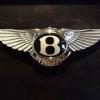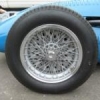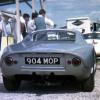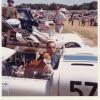Some Christmas reading for you all, to while away those empty hours between Christmas Day and the new year. Because - let's face it - there's probably nothing worth watching on the telly! The title of the thread may not make sense to you yet, but it will. I've been working on this project for about two and a half years and have found myself going down all sorts of internet rabbit holes. I even went to Birmingham to research this - and survived!
Who was Barré Lyndon?
Bill Boddy asked the above question in his ‘Rumblings’ column in the February 2005 issue of Motor Sport. Most people with an interest in 1930s motor sport have probably come across Barré Lyndon’s writings; he was one of the first British journalists to write regularly about European Grand Prix racing after observing it first hand and an acknowledged expert on MGs. His three solo books on motor racing are still much sought-after and the bedrock of any serious enthusiast’s library. He seems to have been an enthusiast of two-wheeled motor sport as well – speedway in particular. But despite this expertise, which could seemingly have sustained a long career in motor sport and motoring journalism, he disappears from view even more suddenly than he had appeared, seemingly abandoning writing about motor racing and also giving up on a monthly motoring column in a national magazine.
It was fully ten months later before even a partial answer to Boddy’s question emerged, when a letter from Stuart Dixon of Blackpool was published in the magazine’s December 2005 issue. Mr Dixon had obviously done some cursory research, but his answer seems to have been primarily based on the scanty and partly inaccurate IMDb entry for Barré Lyndon, who – after writing several stage plays, one of which brought motor racing to the West End stage – moved to the United States and later became an award-winning Hollywood script writer. Motor Sport writer Gordon Cruickshank also added a brief note as a postscript.
So, who was Barré Lyndon? He was actually christened Alfred Edgar Frederick Higgs, but as Gordon Cruickshank’s note explained, he was also Alfred Edgar, who wrote stories for boys. What Messrs Dixon and Cruickshank presumably didn’t know was that as well as acting as a ghost writer he had several other identified noms de plume from his days as a magazine journalist and author of juvenile stories and that in addition to a vast amount of work published anonymously – fiction and non-fiction – there were possibly many, many more ...



















